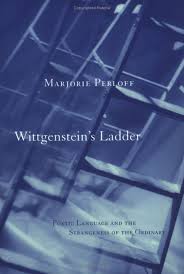Excerpted from WITTGENSTEIN’S LADDER: POETIC LANGUAGE AND THE STRANGENESS OF THE ORDINARY, by Marjorie Perloff  published by the University of Chicago Press. Copyright © 1996 by The University of Chicago. All rights reserved.
published by the University of Chicago Press. Copyright © 1996 by The University of Chicago. All rights reserved.
“He who understands me,” says Wittgenstein on the final page of the Tractatus, “finally recognizes [my propositions] as senseless, when he has climbed out through them, on them, over them. (He must so to speak throw away the ladder, after he has climbed up on it) . . . . then he sees the world rightly” (T #6.54). But no sooner is the world seen “rightly” than new obstacles appear which require new ladders. “Forcing my thoughts into an ordered sequence,” said Wittgenstein, “is a torment for me. Is it even worth attempting now?” (CV 28).
